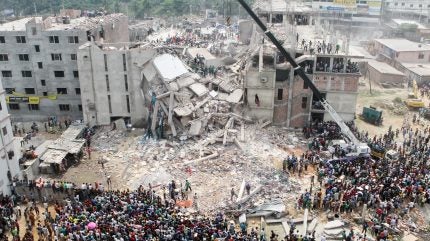
The catastrophic building collapse in Bangladesh on 24 April 2013 claimed at least 1,138 lives, mostly garment workers employed in the five factories within the premises.
The CCC network has reaffirmed its support for those impacted by the calamity and pledges to persistently address the underlying issues that led to the tragedy, such as hazardous working conditions, insufficient wages, corporate irresponsibility, and suppression of unions.
It claimed that only a small number of the 30 brands linked to the Rana Plaza factories have made significant contributions, underscoring the necessity for employment injury compensation laws in Bangladesh, as outlined by ILO Convention 121.
It noted that a pilot programme initiated in 2022 aims to address this need, but there’s also a call for legislation in brands’ home countries to ensure accountability within their supply chains.
Mitigating and addressing workplace injuries and fatalities
Improvements have been noted in factory safety with the establishment of the legally binding Accord on Fire and Building Safety, supported by over 260 brands globally.
However, Clean Clothes Campaign has accused fashion companies Kontoor Brands (Wrangler, Lee), Decathlon, Amazon, IKEA, Walmart, Urban Outfitters, Tom Tailor as allegedly continuing to put their workers at risk.

US Tariffs are shifting - will you react or anticipate?
Don’t let policy changes catch you off guard. Stay proactive with real-time data and expert analysis.
By GlobalDataJust Style had not received a comment from Kontoor Brands (Wrangler, Lee), Decathlon, Amazon, Walmart, Urban Outfitters or Tom Tailor ahead of going to press, while Ikea was unable to provide a comment in time for going to press.
The Clean Clothes Campaign said workplace injuries and fatalities persist in the sector, however since 2022 an Employment Injury Scheme pilot (EIS) has enabled injured workers and bereaved families to seek compensation.
Bangladesh Revolutionary Garment Workers Federation president and IndustriALL Bangladesh Council senior vice president Salahuddin Shapon said: “Twelve years since the Rana Plaza collapse, it is vital that worker safety remains safeguarded. The safety committees at the factory level, trained by the Accord, are now in a weaker position because of the RSC, and a labour code amendment introduced in 2022 under the previous government reduced the rights of workers in factory level safety committees and granted more power to factory owners. This needs to be reversed.”
The Clean Clothes Campaign has also accused fashion brands of not supporting wage demands that labour experts consider essential for lifting workers out of poverty. It explained these inadequate wage adjustments have led to protests and severe repression with many workers still facing unfounded legal charges.
The CCC said its efforts have resulted in the dismissal of mass cases and exoneration of over 10,000 workers from pending charges.
Bangladesh Garment & Industrial Workers Federation (BGIWF) general secretary and IndustriALL Bangladesh Council president Babul Akhter said: “Since Rana Plaza, brands have hardly increased, and sometimes even dropped prices paid for products from Bangladesh. After years of broken promises, binding commitments from brands on wages are the only way to ensure dignified lives for garment workers.”
The Clean Clothes Campaign claimed Swedish fashion brand H&M promised to pay living wages in its full supply chain within five years of the disaster.
An H&M spokesperson responded to this claim by telling Just Style: “We are and remain strongly committed to contributing to continued systematic efforts to ensure further improved fire and building safety in Bangladesh and improved working conditions. We acknowledge the significant efforts made by many actors and the progress achieved in this important area for the whole industry.
“Getting full clearance from RMG Sustainability Council’s inspection is one of our minimum requirements for becoming a business partner for us, and we closely follow the inspection reports and remediation processes.
“We have always supported tripartite structures, that ensure the clear involvement of trade unions, accountability of brands and the engagement of the industry in Bangladesh. In addition to that, we hold regular meetings with the RMG Sustainability Council to follow up on findings and we include our suppliers in the conversation when needed. We remain fully committed to work together and collaborate with other brands and stakeholders in this important area.”
Is a legal obligation for lasting change possible?
On Rana Plaza’s 11th anniversary, the European Parliament endorsed the Corporate Sustainability Due Diligence Directive (CSDDD), which was deemed a step towards eliminating human rights abuses in global value chains and holding brands legally responsible.
However, this landmark legislation could become diluted thanks to the European Commission’s proposed “Omnibus proposal”.
Bangladesh Centre for Worker Solidarity founder and BGIWF president Kalpona Akter said: “The Rana Plaza collapse could happen because brands looked away from the unsafe workplaces, poverty wages, and union busting in their supply chain.
“The twelve years since the collapse have shown that real change can only happen if brands’ behaviours and practices are regulated by robust legal obligations. It is paramount that the CSDDD is not weakened.”
The CCC also urges Bangladesh’s interim government to act on upcoming recommendations from the labour reform and women’s rights committees to prioritise workers’ rights in national legislation.



